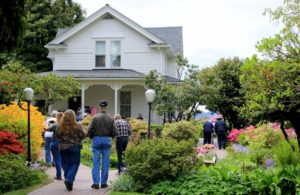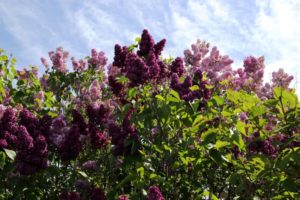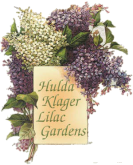The Story of “The Lilac Lady”
 Hulda Klager came to this country from Germany with her family in 1865 when she was two years old. She spoke often of her love for flowers and how as a little girl in Wisconsin she would wander through the woods near her home looking for wildflowers. Her family moved to Woodland, Washington in 1877 when Hulda was 13 years old, where they purchased farmland and built a home.
Hulda Klager came to this country from Germany with her family in 1865 when she was two years old. She spoke often of her love for flowers and how as a little girl in Wisconsin she would wander through the woods near her home looking for wildflowers. Her family moved to Woodland, Washington in 1877 when Hulda was 13 years old, where they purchased farmland and built a home.
Years later, even though Hulda was busy with the demands of marriage, home and family, she continued to find time to work with flowers. While she was recovering from an illness in 1903, some of her friends brought her a book by Luther Burbank, a renowned hybridizer at the time. After reading the book, she was anxious to begin her own experiments with hybridizing plants — especially apples. Her interest in apples came from a desire to save time making pies, because she felt it took too long to peel all those little apples! So she set out to develop a bigger apple by crossing the mild Wolf River apple with the sour, juicy Bismarck apple, and was delighted with the result.
The Lilac Lady
In 1905 she began hybridizing lilacs and by 1910 she had created 14 new varieties. By 1920 she had developed so many new varieties that she decided to hold an open house each spring when the lilacs were in full bloom to share her efforts with other lilac enthusiasts. This practice caused her to become known as “The Lilac Lady.”
 Around 1930 neighboring towns began sending delegations during Mrs. Klager’s “Lilac Week” to choose one of the new varieties she had developed to be named for their community. In this manner lilac varieties such as the “City of Longview,” “City of Kalama,” “City of Gresham,” and “City of Woodland” were designated. Through the years, Mrs. Klager was been honored by many organizations for her work as a leading hybridizer of lilacs including the State of Washington, the Arnold Arboretum at Harvard University, the Federation of Garden Clubs in Washington and Oregon and the City of Portland, Oregon.
Around 1930 neighboring towns began sending delegations during Mrs. Klager’s “Lilac Week” to choose one of the new varieties she had developed to be named for their community. In this manner lilac varieties such as the “City of Longview,” “City of Kalama,” “City of Gresham,” and “City of Woodland” were designated. Through the years, Mrs. Klager was been honored by many organizations for her work as a leading hybridizer of lilacs including the State of Washington, the Arnold Arboretum at Harvard University, the Federation of Garden Clubs in Washington and Oregon and the City of Portland, Oregon.
A Tough Row to Hoe
But Hulda Klager’s career as a hybridizer had many challenges to go along with her great success. Following the death of her husband, Frank Klager, in 1922, she contemplated abandoning her work with lilacs, almost throwing away a number of hand-pollinated plants she had taken a special interest in. But her son Fritz insisted that she continue to nurture them and from these plants came some of her very best lilacs.
The spring of 1948 brought another great adversity when the swirling waters of the Columbia River swept across her property, wiping out her lilac gardens and nearly every other shrub on the place. Only the big trees withstood the flood but undaunted and at the age of 83, she set about rebuilding her garden. Many people who had purchased her lilacs in the past returned starts to her so she could replace her losses.
It took two years and a great deal of work but in 1950 she was able to open her gardens for Lilac Week once again — a practice she continued until her death in 1960.
A National Landmark
 After her death in 1960 at the age of 96, Mr. & Mrs. Van Eaton cared for the estate for a time but sold it after it became too much for them to handle. When the Woodland Federated Garden Club heard it was to be bulldozed to make way for an industrial site, they decided to save it and succeeded in having it declared a state and national historic site.
After her death in 1960 at the age of 96, Mr. & Mrs. Van Eaton cared for the estate for a time but sold it after it became too much for them to handle. When the Woodland Federated Garden Club heard it was to be bulldozed to make way for an industrial site, they decided to save it and succeeded in having it declared a state and national historic site.
In order to get a grant-in-aid to restore the house, it would be necessary to purchase the entire property. One of the members of the Woodland Federated Garden Club, Daisy Button Grotvik, traded seven acres of land she owned in the Woodland bottoms for the four and a half acres of the Klager property. She then deeded the property to the newly formed Hulda Klager Lilac Society, a nonprofit organization that had been formed in 1976 to administer the estate. In this way the land was secured, but the house also had to be purchased. The ladies of the newly formed Hulda Klager Lilac Society raised half of the purchase price from the community of Woodland and the state of Washington matched it with a like amount.
Restoration and Preservation
 The members of the Lilac Society put in many hours of hard work hoeing, spraying, weeding and pruning in order to restore the gardens to the condition they enjoyed under Hulda Klager’s care. The house was also restored and turned into a museum to honor The Lilac Lady. Much of Hulda Klager’s own furniture has been returned, along with other pioneer-era treasures from the Woodland area.
The members of the Lilac Society put in many hours of hard work hoeing, spraying, weeding and pruning in order to restore the gardens to the condition they enjoyed under Hulda Klager’s care. The house was also restored and turned into a museum to honor The Lilac Lady. Much of Hulda Klager’s own furniture has been returned, along with other pioneer-era treasures from the Woodland area.
The woodshed, water tower, and carriage house were restored through another grant-in-aid from Washington State. An outdoor gift shop that offers souvenirs and craft items from local artists is open during Lilac Days. The Lilac Society also revived her annual “Lilac Days” each spring when the lilacs come into bloom, selling lilac plants to visitors just as when Hulda Klager was there.
About the Hulda Klager Lilac Society
 Each year, thousands of visitors step back in time to discover the 1880’s Victorian Farmhouse and country gardens that comprise the Hulda Klager Lilac Gardens. The national historic site is located 30 minutes north of Portland, Oregon and 2-1/2 hours south of Seattle, Washington at 115 South Pekin Road, Woodland, Washington 98674 (mailing address: PO Box 828, Woodland, WA 98674). Pets are not allowed. Only Certified ADA Service animals are allowed.
Each year, thousands of visitors step back in time to discover the 1880’s Victorian Farmhouse and country gardens that comprise the Hulda Klager Lilac Gardens. The national historic site is located 30 minutes north of Portland, Oregon and 2-1/2 hours south of Seattle, Washington at 115 South Pekin Road, Woodland, Washington 98674 (mailing address: PO Box 828, Woodland, WA 98674). Pets are not allowed. Only Certified ADA Service animals are allowed.
To showcase the site, the Gardens and historic buildings have been lovingly maintained by the Hulda Klager Lilac Society, a nonprofit volunteer organization. The Society fully funds the care and upkeep of the historical site from the proceeds of Lilac Days, dues and donations. With the help of our volunteers and members, the Society continues to carry on the work of growing and showing the beautiful lilacs including those hybridized by Hulda Klager many decades ago.

Maintaining the Gardens is truly a labor of love on the part of the Lilac Society. If you would like to join the Lilac Society please visit our Membership page.
